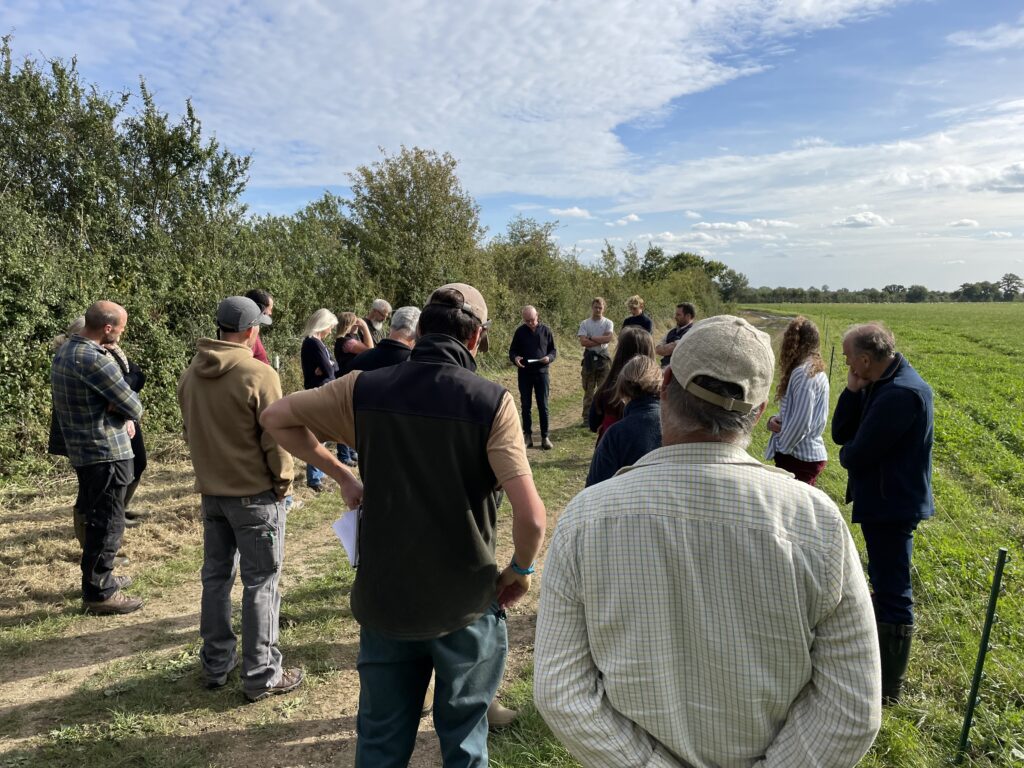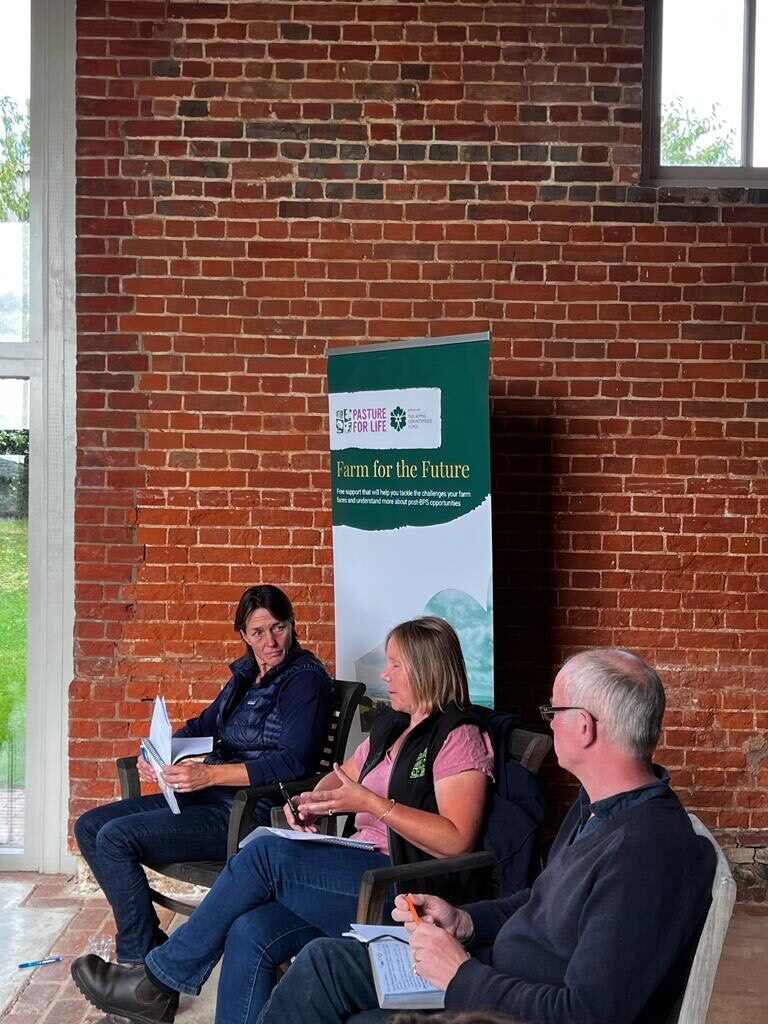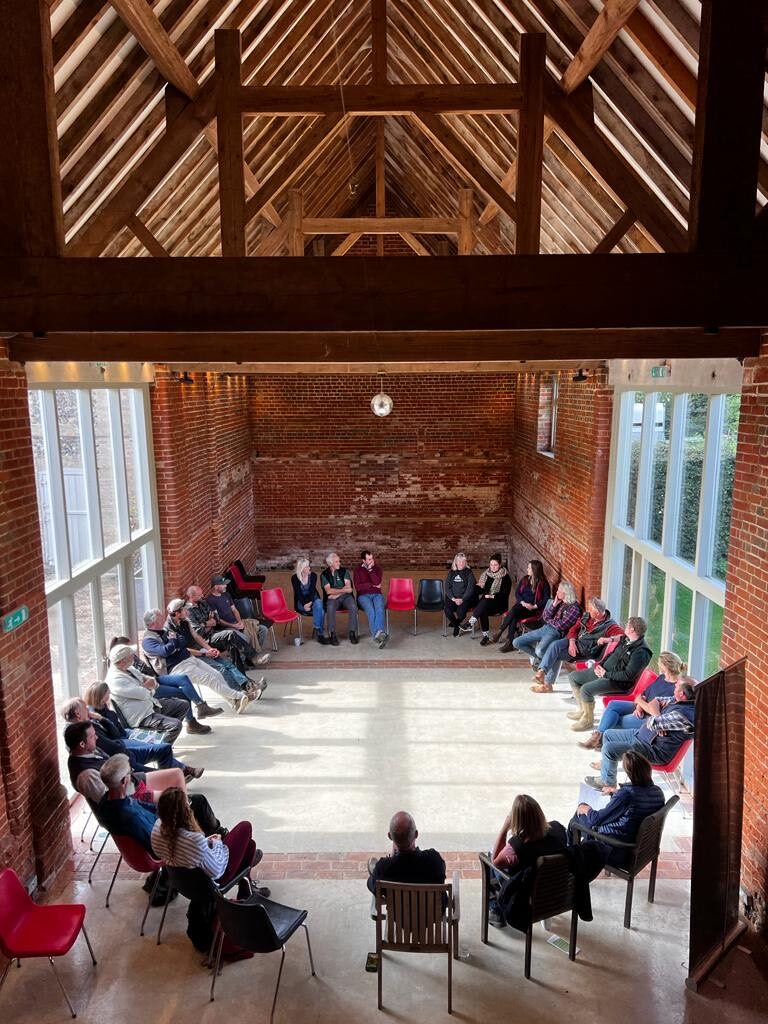Welcome meeting for the ‘Farm for the Future (FftF)’ programme

The Welcome Meeting for the Royal Countryside Fund ‘Farm for the Future (FftF)’ programme took place at Shimpling Park Farm in Suffolk.
A group of 27 livestock farmers from across East Anglia met on the farm, which has been organic for 25 years and currently runs a flock of New Zealand Romney sheep.
The event comprised a lot of talk, a farm walk and a very tasty lunch provided by the hosts, Alice and John Pawsey.
The day kicked off with an introduction to the programme including an explanation of how the 1-to-1 mentoring system would work. PfL Regional Facilitator Rebecca Mayhew then gave a talk about the benefits of running a pasture-fed system, both for the health and welfare of the livestock as well as for the wider benefits to soil health.
 Photo: Programme Manager Sarah Juggins, far left, Regional Facilitator Rebecca Mayhew, centre, and host John Pawsey, right)
Photo: Programme Manager Sarah Juggins, far left, Regional Facilitator Rebecca Mayhew, centre, and host John Pawsey, right)
Participants on the course are all entitled to a year of free Pasture for Life membership and Rebecca outlined the courses, research and general knowledge sharing that this would bring.
Sarah Juggins – the programme delivery manager – then chaired a discussion between Rebecca and John about the two core focus points underpinning the FftF programme. As two farmers who both run farms that have a lot of diverse businesses under the farming umbrella, Rebecca and John were able to share a lot of information about spotting opportunities, understanding and working within acceptable levels of risk-taking and driving the business forwards.
When it came to introducing new ideas, John’s advice was to ‘listen to your own gut reaction’, while Rebecca spoke about the importance of thinking through every angle before taking the plunge.
The wealth of knowledge and experience around the room was also impressive. Toby Tibbenham explained how his business planning began with a honest appraisal of how much he needed to farm to make to cover every cost, including meeting the financial needs of every stakeholder. From that point, he said, you could then start to see what you ‘needed’ to do and what you could ‘choose’ to do.
Andy King described how one public-facing income stream – a pumpkin patch – had led to another income stream – seeng lambs born. The idea meant he had changed his lambing times but the outcome was a pumpkin patch with added value.
A lot of heads nodded when the question of persuading family members and staff to change the way things were being done on the farm. John Pawsey explained how he had changed his own style of management so he no longer told people what was happening but rather it was a team effort. The farm’s shepherd, Jo, was on hand to demonstrate the fact that the running of Shimpling Park was a team effort as he led the farm walk and explained the grazing system operating across the farm.
The discussion moved from Business to the Environment and John and Rebecca outlined the changes and opportunities offered by the SFI standards. It was generally agreed around the room that a few hours spent looking at the SFI standards and realising where they could be implemented across a farm was time very well spent. There was plenty of debate around the likely eradication of sprays and fertilisers; whether the plough would become obsolete and how fly strike could be controlled if conventional treatments were banned.

Lunch – a very tasty shepherds pie made from Shimpling Park organic lamb – was followed by a farm walk. This took in various herbal leys, a discussion on fencing, a chat about the value of margins and hedgerows and a visit to John’s agroforestry area. He explained that deer were a huge problem and some of the deer-ravaged trees bore witness to this.
The day was a success in many different ways. It was a good introduction to the Farm for the Future programme. The way it was set up allowed people to talk freely and tap into each other’s knowledge – not just the wealth of knowledge provided by John and Rebecca. several people commented afterwards that the networking opportunity afforded by the event was immeasurably invaluable. Certainly the hub-but of chatter over lunch and as the farm walk took in the beautiful landscape of Suffolk was s sign that this is going to be both an enjoyable and thought-provoking programme of workshops.
If you are an East Anglian livestock farmer it is not too late to sign up for this programme. Fill in the online form or contact Sarah Juggins for more information: sarah.juggins@pastureforlife.org
https://www.tfaforms.com/5019669



